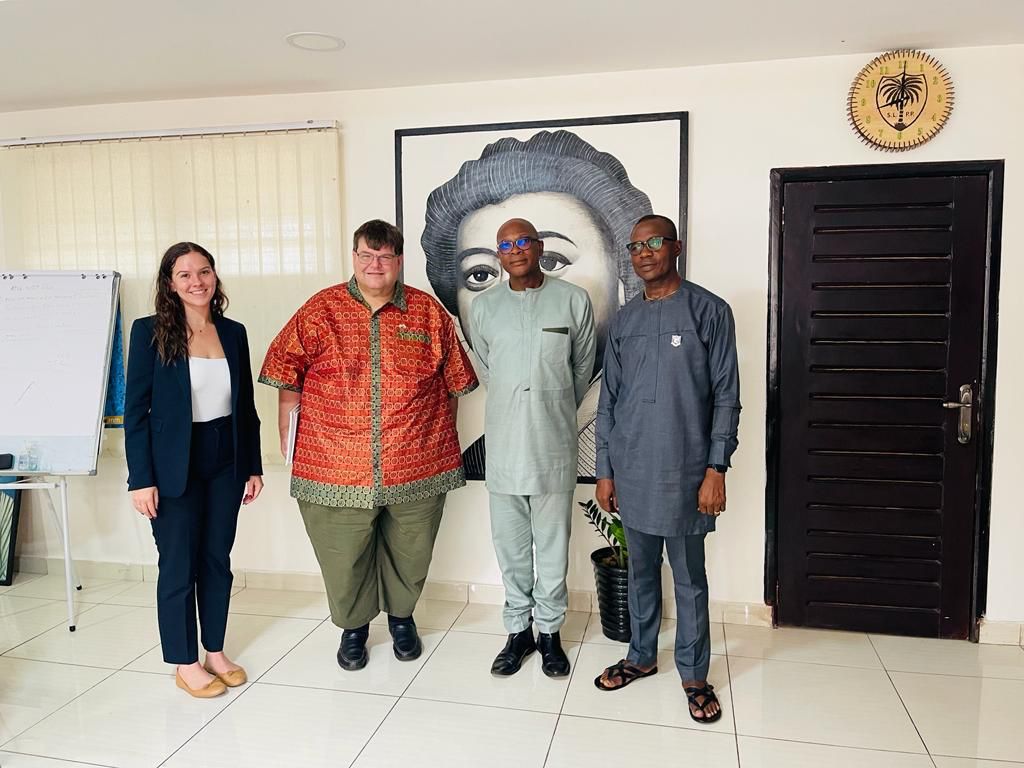By Sahr Ibrahim Komba
The United States Ambassador to Sierra Leone, Bryan David Hunt, has expressed concern that neither the Electoral Commission for Sierra Leone (ECSL) nor political parties were able to provide clear evidence to substantiate the 2023 election results. He noted that this lack of accountability has paralyzed the country’s economy, as political reforms remain stagnant and trust between political leaders is at an all-time low.
This call was made during a two-day National Conference on “Mobilising the Civil Society Community towards Genuine Electoral Reforms, Peace, and National Cohesion,” organized by the National Election Watch (NEW) at the Shangri-La Hotel, Lumley. The event comes in the aftermath of the controversial 2023 multi-tier elections, which saw the opposition All People’s Congress (APC) initially boycotting governance processes, contributing to economic setbacks. The APC only re-engaged after intervention from development partners.
“The opposition’s refusal to participate in governance has contributed to economic paralysis, and there has been no political reform to address this,” Mr. Hunt remarked. He criticized the formation of the tripartite committee for lacking representation from civil society, and argued that electoral challenges have persisted since the end of Sierra Leone’s civil war.
“The issues highlighted in electoral reports from 2000 to 2023 are essentially the same. There is an urgent need to resolve these challenges once and for all,” the Ambassador stressed. He also pointed out that political compromise in forming the tripartite committee hindered its efficacy, but maintained that if its recommendations are implemented, they could transform the country’s political processes.
Mr. Hunt urged citizens to support the reformation process and work with both the government and opposition to ensure the implementation of the report. He cautioned against allowing hardliners to derail progress, insisting that political reforms are essential and can only be achieved through active citizen participation.
Civil Society Organizations (CSOs) in Sierra Leone also joined in urging political actors to swiftly implement the tripartite recommendations to reform the country’s electoral system. At the conference, Marcella Samba Sesay, Chairperson of the National Election Watch, emphasized the importance of addressing the recommendations of the tripartite committee to ensure lasting electoral reforms in Sierra Leone. She stressed the need for restructuring governance processes, highlighting that comprehensive institutional reforms are essential for a more accountable electoral system.
“There is an urgent need for institutional, social, and legal reforms to ensure accountability in our elections. Electoral reforms are not the responsibility of any single individual but must be a collective effort,” Marcella Sesay stated. She urged political parties to collaborate in building a prosperous nation, emphasizing that implementing the tripartite recommendations is crucial for reshaping Sierra Leone’s governance processes.
Ransford Wright, head of the Independent Media Network, also weighed in, highlighting the media’s crucial role in ensuring transparency and accountability in the electoral process. Mr. Wright called on CSOs and the media to actively educate the public on the tripartite committee’s work and urged political leaders to refrain from spreading misinformation or fake news.
“A vibrant democracy thrives in an environment where the rule of law prevails. The recommendations of the tripartite committee can only be realized if we all work together in peace-building,” Wright stated.
A representative from the European Union (EU) emphasized that electoral reform must be a homegrown effort, with development partners like the EU playing a supportive role. She called on all stakeholders to work together to foster peace and urged authorities to prioritize dialogue as a means of strengthening national cohesion.
“Electoral reform is a Sierra Leonean process. Development partners can offer support and advice, but the ownership of the reform process lies with the people and leaders of Sierra Leone,” the EU representative remarked.
Chief Minister Dr. David Moinina Sengeh, who also spoke at the event, reaffirmed the government’s commitment to working with CSOs, the media, and other stakeholders to implement the tripartite report. He stressed the importance of creating public dialogue and engaging in constructive conversations, particularly in the context of peace-building and national reconciliation.
“We must use decent language in our discussions to ensure we make progress toward peace-building,” Dr. Sengeh stated, adding that civil society organizations themselves must also undergo reforms to enhance their accountability.
Dr. Sengeh reiterated the government’s dedication to implementing the electoral reform recommendations and urged the public to rise above individual interests for the sake of achieving national goals. “Our commitment to electoral reform is unwavering, and it is vital for the future of Sierra Leone’s democracy,” he concluded.
The two-day conference brought together key stakeholders, including CSOs, government representatives, media practitioners, and international development partners, all aiming to forge a path forward for genuine electoral reform and national cohesion. The implementation of the tripartite recommendations is seen as a critical step toward ensuring fair, transparent, and accountable elections in Sierra Leone, a cornerstone for sustainable peace and development.

